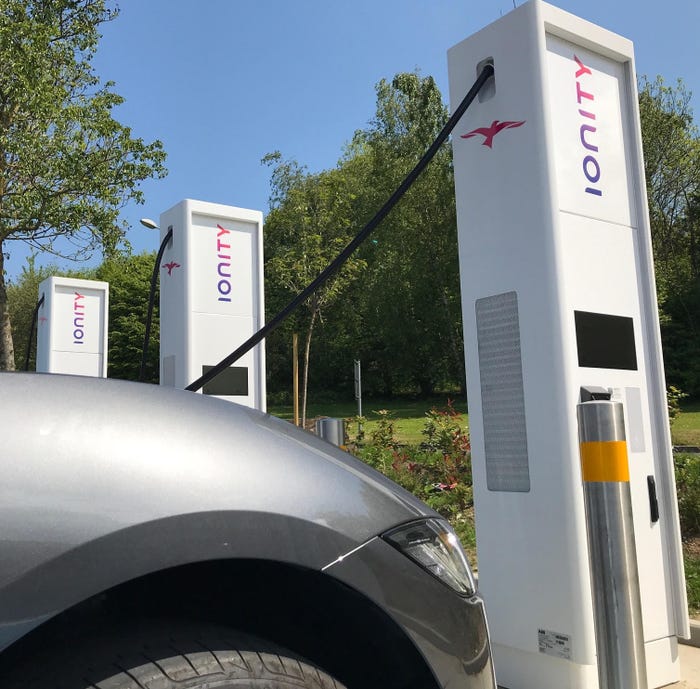Tires Are the New Oil Change
CDK study explores how EVs will boost service work.

While not very positive about the introduction of electric-vehicle service to their dealerships, participants in CDK’s EV Service: Today and Tomorrow survey anticipate an increase in both service department repair orders and warranty work as EV volume grows.
That dichotomy reflects the ambiguity EV service represents to dealerships, Dave Thomas, director of content marketing and automotive industry analyst at CDK Global, tells Wards.
“Whatever you are feeling about EVs, they are coming. And they are coming to your service and your sales (departments) and there are pros and cons,” he says.
CDK surveyed 188 service directors, managers or supervisors, and people in executive leadership roles from July 27 through July 31, 2023. They represented different sizes of dealership groups and locations. An overwhelming majority, 85%, were already servicing EVs.
A slim majority of 53% felt “positive” about the introduction of EV service. “That didn’t scream ‘positive’ and the comments didn’t scream ‘positive’ to us,” says Thomas.
However, a strong majority anticipated a positive impact on both repair orders and warranty work in their stores over the next three years.
“When you look at what is happening today as far as ROs (repair orders) and money they are making and what they see happening, those numbers and revenue are very positive,” says Thomas.
Specifically, 88% expected RO volume to increase and 89% expected EV warranty volume to increase.
Of those surveyed, 78% expected EV service revenue to increase over the next three years.
Those expectations are not unfounded, says Thomas. EVs are full of new technology, he points out. “They are going to have more problems at the onset, meaning they have to come in for service.”
Respondents expected software issues to be the most frequent service issue (38%), followed by a tie between tire issues and technical issues with display systems, each at 18%.
One respondent told CDK “when it comes to EVs, tires are the new oil change,” and his reasoning holds water.
Because of their heavy batteries, many EVs weigh significantly more than internal-combustion-engine vehicles so tire rotations are very important. For example, a rotation for a Hyundai Ioniq 6 is recommended annually or every 8,500 miles (13,685 km) and a rotation every 7,500 miles (12,075 km) that isn’t tied to a time frame at all is recommended for a GMC Hummer pickup BEV.
Dealers felt service-customer retention would stay the same or increase with the introduction of EVs. Only 22% saw it decreasing.
EVs do give dealership service departments an edge over independent repair shops because of the specialized training required, says Thomas.
”There is not this type of (EV repair) training going on at the independent level,” he says. “It will be a big investment for the independents.”
Put on a Happy Face
Training is a potential weakness for dealership service departments, however.
While the overwhelming majority of dealerships invested in adding charging stations and 54% had separate service bays for EVs, the survey showed a less rosy picture when it came to technician training.
Dealers preferred to train their existing technicians to service EVs but 42% said persuading those technicians to receive EV training was “difficult.”
That may be due to the general negativity of the conversation about EVs in the dealership, says Thomas. If they hear a lot of negative EV comments, “why would your staff want to be positive?” he says.
Thomas recommends stressing that EVs are the future and that by receiving EV training technicians are “future-proofing” their career. “These types of word choices matter,” he says.
CDK found three clear takeaways from its survey results, the first of which even those techs resistant to EV training can likely get behind: Get into the tire business.
Dealerships need to put the same effort toward educating EV consumers about the need for frequent tire rotations as they do about getting oil changes, says Thomas. “The consumer does not understand tire maintenance,” he says.
Thomas encourages dealers to put the image of being stuck on the side of the road with a tire problem into consumers’ minds along with “this is what you need the dealer to check for you.”
A second takeaway: Dealers need to incentivize EV training with salary considerations, extra vacation days or a one-time bonus.
“Maintaining enough trained staff will become more important as more models and volume hit the market,” the report says.
The last takeaway: EVs could be a net positive for service.
Fear of reduced service revenue has been a persistent trend accompanying the rise of EVs. But, says Thomas: “I think that is old thinking. Now we are coming to a different point of view.”
About the Author
You May Also Like





.jpg?width=700&auto=webp&quality=80&disable=upscale)